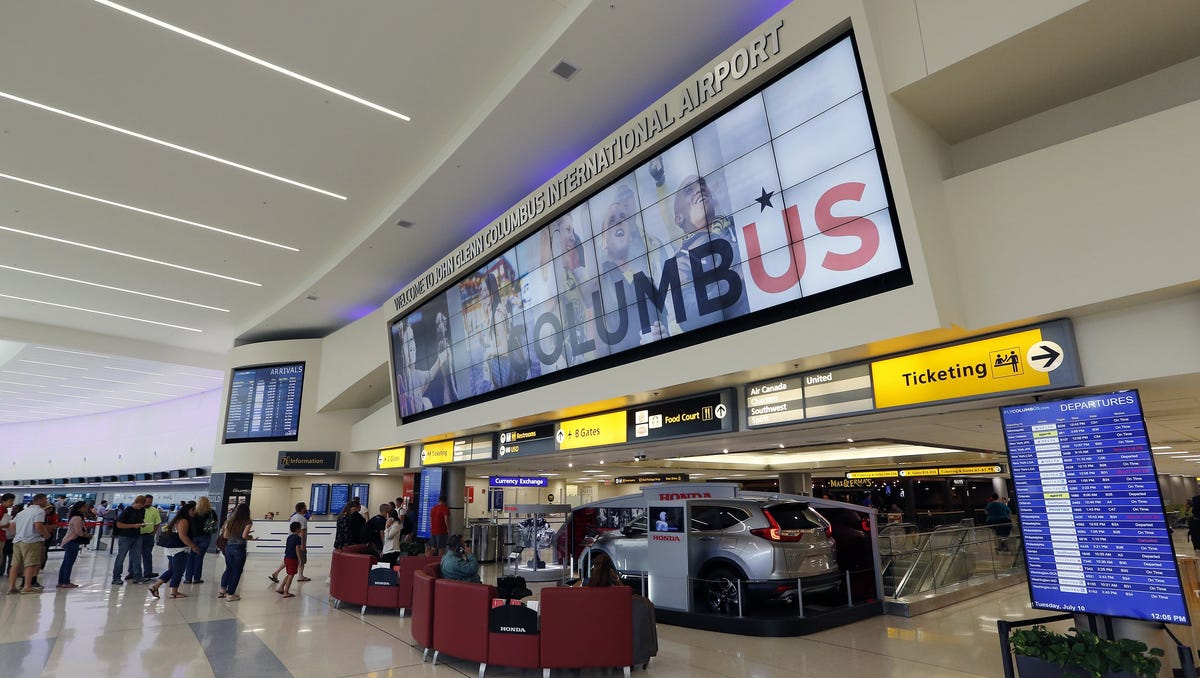Jobs
Senate candidate Tim Sheehy’s firm promised jobs and more to a Montana county. It’s still waiting.

Bridger Aerospace Group, a Montana-based aerial firefighting company helmed by Tim Sheehy, a former Navy SEAL, was losing money in 2020 when its top executives made a business pitch to elected officials in the county where it’s based.
At a recorded public meeting, the executives asked whether Bridger could use Gallatin County’s name and pristine credit rating to raise $160 million in a municipal bond offering. If the three county commissioners said yes, Bridger would gain access to lower-cost money to expand its operations.
Gallatin County would also benefit from the deal, company officials promised. The money, they said, would be used to hire more workers, build two airplane hangars at the Bozeman airport with a local construction company and increase firefighting capacity in the region. And if the worst were to happen and Bridger defaulted on the debt, Gallatin County wouldn’t be on the hook.
A win-win-win, the executives said.
Some of the county commissioners expressed hesitancy, the recording shows. Bridger was a startup — just over five years old — one pointed out; another said the county had never done a deal like that at such a scale.
After a 45-minute discussion, the officials unanimously approved the issue. “I think this has a potential to give us significant public benefit,” said Joe Skinner, a rancher and commissioner, the recording shows. That the county wouldn’t be financially liable had clinched the deal.
Four years later, Bridger is still losing money, its securities filings show, and the $160 million bond deal that sprang from that 2020 meeting is under scrutiny as Sheehy vies for a seat in the U.S. Senate.
Sheehy, a decorated veteran endorsed by former President Donald Trump, cites his business acumen as a reason voters should send him to Washington. He hopes to unseat three-term Democratic Sen. Jon Tester next month and is ahead in recent polls. A win by Sheehy could turn the Senate red.
But some of the benefits that Bridger officials predicted Gallatin County would reap as a result of the deal haven’t come to fruition. After it issued the bonds in 2022, securities filings show, Bridger used the vast majority of the money it got to pay off previous investors.
All told, $134 million of the $160 million in proceeds left Montana and landed in the New York City coffers of the Blackstone Group, a prestigious private equity firm that previously invested in Bridger. The bond offering disclosed the information, and Blackstone didn’t dispute the calculation.
Four years after the meeting where the Bridger executives made their pitch, only one of the two new hangars has been built. The company’s cash flow has also failed to meet the threshold it had promised bondholders it would maintain, securities filings show. The number of workers Bridger employs has declined, according to its most recent figures.
Justin Marlowe, a research professor at the University of Chicago Harris School of Public Policy and director of its Center for Municipal Finance, said such deals can harm local governments.
“When, where and how benefits accrue locally when local governments support these types of business ventures is exactly the right question to ask,” Marlowe said. “If the project fails, it sends a signal about the future of that jurisdiction.”
Sheehy, who stepped down as CEO of Bridger in July, declined to be interviewed for this article, and his press secretary didn’t respond to detailed questions.
A Bridger spokeswoman said that the company is working to repair its cash flow problems and that the bonds are backed by “robust collateral which has appreciated significantly in value since the bond was issued.” Using the bond money to pay off Blackstone is a common practice companies use, she said, to replace “higher-cost and more restrictive financing.” The spokeswoman didn’t provide details about the collateral or how the company had calculated its appreciation.
In a statement, Sam Davis, Bridger’s CEO, said Gallatin County’s support for the company has been “tremendous.” It has allowed Bridger to “contract with multiple local businesses as we expand and operate our business, and provide a strong customer base to local hotels, restaurants, and transportation providers,” he said. Since the bond issue, he added, Bridger has fought more than 160 Montana wildfires, savings lives and property.
Still, the company has reported almost $150 million in losses since the bond issue in July 2022, and its stock price at Monday’s close was $3.60, down 64% from when it became public in January 2023. The S&P 500 is up 44% since then.
Bridger, which counts on an active fire season to generate revenue, has also encountered a somewhat lighter forest fire season this year. As of Thursday, there had been 42,594 fires nationwide this year, according to the National Interagency Fire Center, below the 10-year average of 48,689 for the same period.
Warned on finances
As Sheehy has campaigned on Bridger’s success, his company’s financial standing has wobbled, raising questions about its ability to pay interest and principal on the bonds Gallatin County helped it raise.
Bridger’s independent auditor recently warned that Sheehy’s company may not have the resources to continue operating over the next 12 months. Academic research shows that 17% of companies receiving such auditor warnings file for bankruptcy within a year; that compares with 1.8% of distressed companies that default within one year.
Bridger has continued to pay the interest it owes on the bonds, its spokeswoman said.
At the same time, even though Gallatin County isn’t financially liable if Bridger defaults on the bonds, its stellar credit rating could take a hit, experts said. That would increase its costs of borrowing to pay for schools, roads and other services.
As of August, only one of the two hangars Bridger said would be built with the bond money has been erected; construction on the other hadn’t started, its securities filings show. As for new jobs, the number of workers the company employed fell to 148 in December, the most recent month for which figures are available, down 11% from the previous year.
In July 2022, the month Bridger began receiving the proceeds of the bond issue, it spent $3.85 million to buy a small, single-engine aircraft, a Pilatus PC-12, from Sheehy, then the CEO, securities filings show.
The company paid Sheehy $850,000 more than what he spent when he bought it a year earlier, the filings show. Bridger also had to repair and upgrade the aircraft for operational use, filings show.
Bridger’s spokeswoman said none of the bond proceeds were used to buy the plane. Sheehy’s campaign didn’t respond when it was asked why he considered the company’s purchase of a plane he owned a good use of the company’s capital.
Few questions asked about bond issue
Records show that the discussion of the Bridger bond issue at the October 2020 Gallatin County commissioners meeting issue lasted 45 minutes. Nathan Bilyeu, a lawyer from a Helena law firm serving as bond counsel for the state and the county, said the meeting’s goals were to determine whether the deal was in the public’s interest and whether Gallatin County would benefit from it.
Commissioners then heard public comments in support of the deal and presentations from two top Bridger executives about how they expected to deploy the $160 million. The commissioners got repeated assurances that Gallatin County wasn’t on the hook financially if Bridger failed to pay on the bonds.
Two items didn’t come up in the discussion. One: the fact that Bridger’s financial results had already fallen below a threshold it had promised a private lender it would maintain, securities filings show. Asked why Bridger’s executives didn’t bring up that detail at the meeting, the spokeswoman didn’t respond.
The second item that wasn’t publicly discussed involved collateral damage to Gallatin County if Bridger’s bonds, known as conduits, went bad. If Bridger defaulted on the bonds, the county’s borrowing costs could rise.
Such outcomes have happened to other communities backing conduit bonds, said Marlowe, of the University of Chicago. “In a couple of recent cases, the market has looked at these kinds of issuances when there has been a default and said, ‘In fact, even though you don’t have a financial obligation, there is a moral obligation or indirect obligation,’” he said.
He pointed to a case last year when ratings giant Standard & Poor’s downgraded the credit rating of a Chicago-area municipality after the default of a bond issue similar to Bridger’s.
The municipality, the village of Bolingbrook, didn’t cover the missed payments, and S&P said the default represented “a weak risk management, culture, and oversight governance” at the municipality. The downgrade made it more expensive for the village to borrow money going forward.
That just one of the Bridger hangars has been built also poses potential problems for bondholders, according to the offering statement. Noncompletion of the financed hangars, it said, “would materially adversely affect the value of the security under the Leasehold Deed of Trust.”
The Bridger spokeswoman didn’t respond to a question about whether bondholders should be concerned about that. The second hangar was estimated to cost $14.4 million, securities filings show.
Few complaints from county commissioners
The fact that so little of the $160 million in proceeds from the Bridger bond stayed in Gallatin County doesn’t trouble Zach Brown, a Gallatin County commissioner elected just after the October 2020 vote.
“It isn’t our role to monitor the construction and operational decisions of a private company or communicate to the community the status report of how they’re doing,” Brown said in a phone interview. “Our role is not to monitor whether they added jobs — it is to endorse the public interest of their project.”
Brown suggested that NBC News speak with Bilyeu, the state and county bond counsel, for more answers. Bilyeu didn’t respond to repeated interview requests. Neither did former commissioner Skinner, whom NBC News called to talk about his vote on the Bridger bond.
The view that municipal officials needn’t worry about where bond proceeds go in such deals is outdated, Marlowe said.
“As an elected official, you have to understand that when the county’s balance sheet is pledged directly or indirectly, it does reflect on the county,” he said. “And you do have an obligation to understand what is being done with the proceeds.”
Today, Brown and other Gallatin County officials say, concerns that the county could be hurt by a failure of the Bridger bond issue are “based on a misunderstanding.” In addition, they said, the commissioners were told back in 2020 that Bridger had indemnified them personally, as well as the county, against any potential liability.
While such promises are common in such deals, probably to quiet government officials’ liability concerns, Marlowe said it’s unlikely that an indemnification would be worth much if the Bridger bond issue failed.
“Gallatin County should expect that Bridger will not cover any of the costs to unwind this transaction,” he said.
Bridger’s spokeswoman didn’t answer a question about how a failure would affect the indemnification.
At the 2020 meeting about the bond issue, Sean Bowen, a deputy county attorney, was asked whether the county was comfortable approving it. Bowen said he hadn’t personally reviewed the arrangement.
“That’s why we get bond counsel to do these things,” he said. “So that they can work on these issues that we don’t have the expertise to deal with.”









